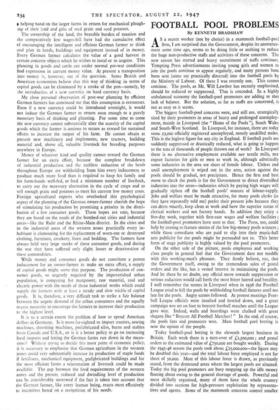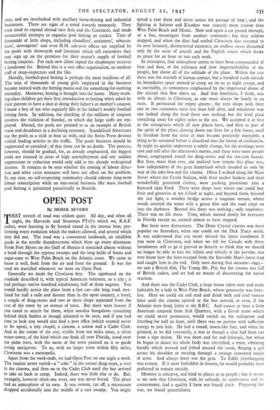FOOTBALL POOL PROBLEMS
By KENNETH BRADSHAW
AS a recent worker (not by choice) in a mammoth football-pool firm, I am surprised that the Government, despite its announce- ment some time ago, seems to be doing little or nothing to reduce the huge non-productive staffs and activities of these concerns. The new season has started and heavy recruitment of staffs continues. Tempting Press advertisements inviting young girls and women to join the pools continue to appear regularly, and many persons have been sent (some say practically directed) into the football pools by the Ministry of Labour. Of these I was recently one. This cannot continue. The pools, as Mr. Will Lawther has recently emphasised, should be reduced or suppressed. That is conceded. In a highly unbalanced economy the football-pool promoters are adding to that lack of balance. But the solution, as far as staffs are concerned, is not as easy as it seems.
The biggest football-pool concerns were, and still are, strategically sited by their promoters in areas of heavy and prolonged unemploy- ment, mainly in Liverpool (the " Home of the Pools "), South Wales and South-West Scotland. In Liverpool, for instance, there are today some 23,000 officially registered unemployed, mostly unskilled males. This is the highest figure for any city in England. If football pools are suddenly suppressed or drastically reduced, what is going to happen to the tens of thousands of people thrown out of work? In Liverpool there is no alternative employment available nor textile mills, nor export factories for girls or men to work in, although admittedly some industries in the area are short of female labour. Unless and until unemployment is wiped out in the area, action against the pools should be gradual, not precipitate. Hence the first and best move to check the pools is for the Government to direct diversified industries into the areas—industries which by paying high wages will gradually siphon off the football pools' sources of labour-supply. Jobs and welfare must be made attractive, for many pools clerks (as they have repeatedly told me) prefer their present jobs because they can dress smartly, keep clean at work and have the superior status of clerical workers and not factory hands. In addition they enjoy a five-day week, together with first-rate wages and welfare facilities ; the football-pool promoters have seen to that. The Press, too, could help by ceasing to feature stories of the few big-money pools winners ; while those comedians who are paid to slip into their music-hall acts publicity for the pools might be persuaded not to. This latter form of stage publicity is highly valued by the pool promoters.
On the other side of the picture, pools employees and working class people in general feel that the Government dare not meddle with this working-man's pleasure. They firmly believe, too, that the Government itself, owing to the tremendous sales of postal orders and the like, has a vested interest in maintaining the pools. And let there be no doubt, any official move towards suppression or serious reduction would call forth the most bitter hatred and hostility. I well remember the scenes in Liverpool when in 1936 the Football League tried to kill the pools by withholding football fixtures until too late for the pools. Angry scenes followed. At protest meetings Foot- ball League officials were insulted and howled down, and a great campaign was set on foot to boycott football matches until the League gave way. Indeed, walls and hoardings were chalked with great slogans like " Boycott All Football Matches! " In the end, of course, the pools fans and promoters won. Mass football pool betting is now the opium of the people.
Today football-pool betting is the eleventh largest business in Britain. Each week there is a turn-over of "Lx,soo,000 ; and postal orders to the estimated value of £75o,000 are bought weekly. During the 1945-46 season the pools took about L25,000,000—the figure may be doubled this year—and the total labour force employed is not far short of 50,000. Most of this labour force is drawn, as previously stated, from the distressed areas where the largest pools are situated. Today the big pool promoters are busy mopping up the idle money floating about owing to the general shortage of goods. Powerful and most skilfully organised, many of them have the whole country divided into sections for high-pressure exploitation by representa- tives and agents. Some of the mammoth concerns control smaller ones, and are interlocked with ancillary horse-betting and industrial businesses. There are signs of a trend towards monopoly. They even tried to expand abroad into Asia and the Continent, and made unsuccessful attempts to organise pool betting on cricket. Tens of thousands 'of little shops, including chandlers', stationers', tobacco- nists', newsagents' and even H.M. sub-post offices ale supplied by the pools with showcards and literature which tell customers they may sign up on the premises for their season's supply of football betting coupons. For each new client signed the shopkeeper receives a handsome fee. Behind this is a vast office organisation, an outdoor staff of shop-inspectors and the like.
Morally, football-pool betting is perhaps the most insidious of all. The tens of thousands of young girls employed in the business become tainted with the betting mania and the something-for-nothing mentality. Moreover, betting is brought into the home. Many work- ing-class children get their first introduction to betting when asked by their parents to have a shot at doing their father's or mother's coupon. I know a boy of ten who regularly fills in his father's weekly football betting form. In .addition, the checking of the millions of coupons involves the violation of Sunday, on which day large staffs are em- ployed. Abroad, the pools are pointed to as an example of British waste and decadence in a declining economy. Scandalised Americans use the pools as a stick to beat us with, and the Swiss Press devotes critical leading articles to the traffic. The pools business should be suppressed or curtailed ; of that there can be no doubt. The process, however, should be gradual, for, as already emphasised, the biggest pools are situated in areas of high unemployment and any sudden suppression or reduction would only add to the already widespread distress. It remains to be seen whether the coming of labour direc- tion and other crisis measures will have any effect on the problem. In any case, no self-respecting community should tolerate long-term labour conscription while an anti-social business like mass football pool betting is permitted parasitically to flourish.



































 Previous page
Previous page